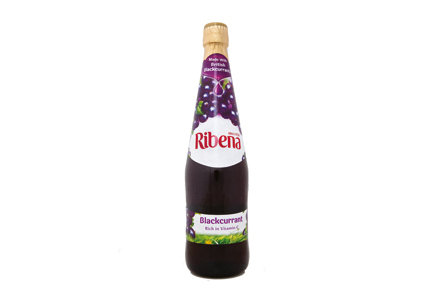
Drinks brand Ribena was created in the 30s, when Dr Vernon Charley, working on behalf of HW Carter & Co, was researching the use of fruit juices to flavour milkshakes. His original research was unsuccessful and, instead, the Bristol food and drink company found it had developed a blackcurrant cordial drink. In 1938, the Ribena brand was born.
Dr Charley had made a drink that was regarded not only as a tasty beverage, but also noted for its high vitamin C content. This led to its use as a dietary supplement for children by the Ministry of Food during World War II.
Ribena's manufacturer had little control over the distribution and direction of its product during the war. However, when the conflict ceased, it built a factory at Coleford near the Forest of Dean and the company, rather than the Ministry of Food, could begin to shape the brand.
In 1955, the Ribena product and brand was acquired by Beecham Foods, part of the Beecham Group. The group merged with SmithKline Beckman in 1989 and after another merger it became part of GlaxoSmithKline (GSK), which still owns the brand.
GSK has continued to innovate since the takeover, and has launched a variety of Ribena products in an attempt to maintain its position as the market leader.
It was the first major squash brand to be available in a ready-to-drink package, a product which today stands as second-top seller in the sector.
Other products created by the company include Ribena Sparkling, as well as the Ribena Plus range with vitamins A and C. Ribena Really Light is a low-calorie version of the drink, with no added sugar.
It is this sort of creativity and awareness of target markets that help to make Ribena a continued success.
GSK works hard to play on the brand's health benefits. Its vitamin-rich mix is a selling point, and it acts as a powerful antioxidant and contains no artificial flavours, colouring or sweeteners.
GSK actively aims Ribena products at 'balanced' mothers and young women. It targets mums who want to give their children a tasty treat that doesn't have a negative impact on their health, and younger women who are conscious of the brand's benefits to their own health.
Ribena is also marketed as an environmentally friendly brand. It is available in a 500ml ready-to-drink bottle that is 100% recycled. In addition, its ready-to-drink Tetra Pak cartons are also widely recyclable.
Now 74 years in existence, Ribena continues to be a strong brand and a profitable product for GSK, both in the UK and worldwide.
BRAND LESSON

By James Joice, client director, JKR
It's only when you compare the current Ribena bottle (above) with its ancestors on the right that you realise how much it's changed over the years. It's a bit like Heinz Baked Beans. They never seem to alter, yet previous editions look ancient alongside today's tin. The best design creates this illusion. It gently nudges a brand along without us noticing, ensuring that it always feels relevant to now, while remaining entirely true to itself.
You can be pretty certain that when the current Ribena design was at the concept stage and being researched, consumers told the moderator that it was 'exactly the same' as the one they had at home.
The best possible validation: the brand as it's seen in the mind's eye.
Of course, the continuity of the tall, slender bottle shape is central to this recognition.
Mastering the art of imperceptible change has preserved Ribena's familiarity and prevented it from feeling old-fashioned. The reward is that we give it to our children, just as our parents gave it to us. This passing-down is also a product of permissibility: Ribena has always radiated wholesomeness. The blackcurrant bunches, the warmth of the purple, the gold foil around the cap and the subtle sophistication within the type all make it feel more acceptable than its more garish competitors.
Ribena provides a lesson in how careful custodianship can ensure a brand means as much to one generation as it does the next.
TIMELINE
1938: The Ribena brand name, derived from Ribes Nigrum, the Latin for blackcurrant, was first used. This came after the initial creation of Dr Vernon Charley's blackcurrant syrup earlier that decade.
1941: Almost all of the blackcurrant syrup produced by Ribena at this time was freely distributed to children as a dietary supplement, by order of the Ministry of Food.
The company also developed a rosehip syrup for commercial purposes.
1944: The company was allowed to revert to selling Ribena.
1946: A Ribena factory was built at Coleford, near the Forest of Dean, following bomb damage to its old factory during the war. Ribena is still produced there.
1955: Beecham Foods Limited, part of the Beecham Group, acquired Ribena. Beechams later went on to become part of GlaxoSmithKline.
1982: Ribena became the first major drinks brands to package its product in ready-to-drink cartons.

